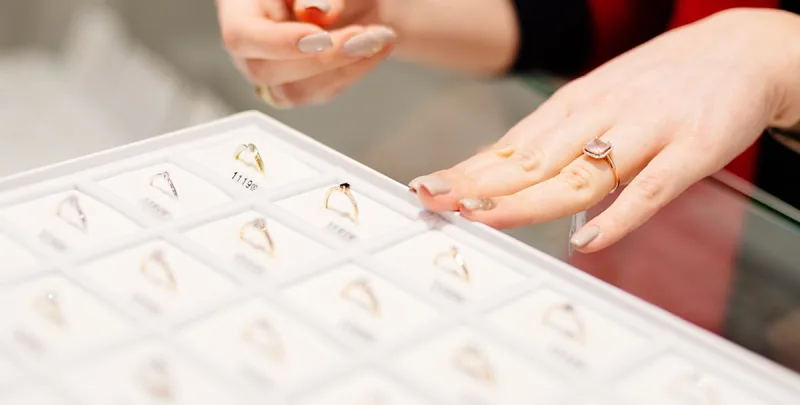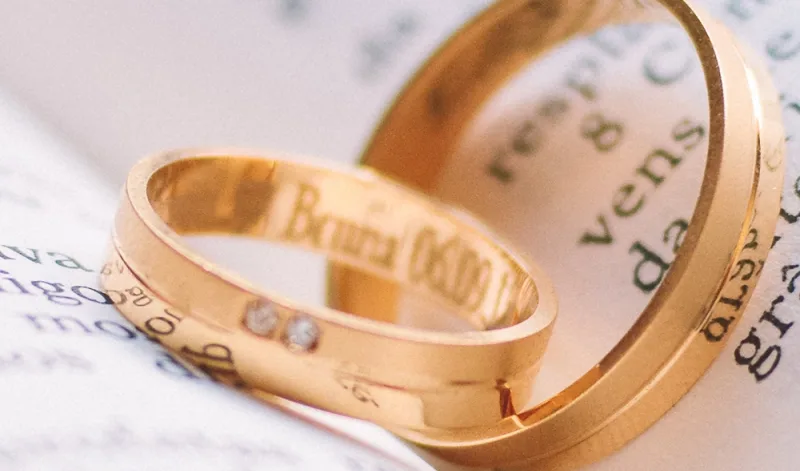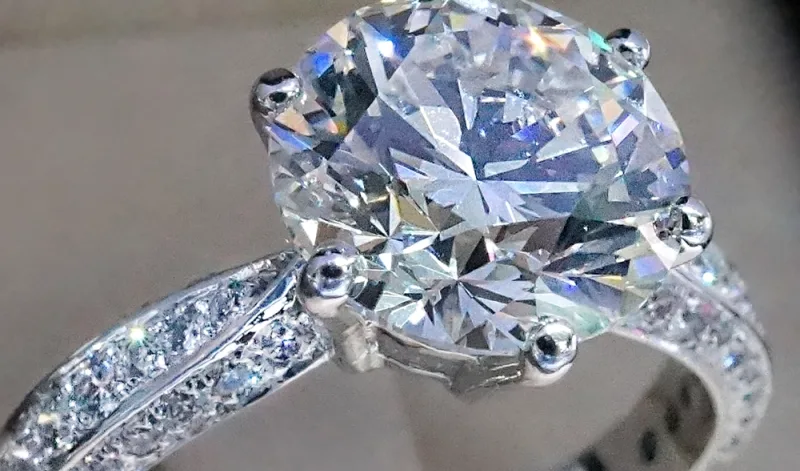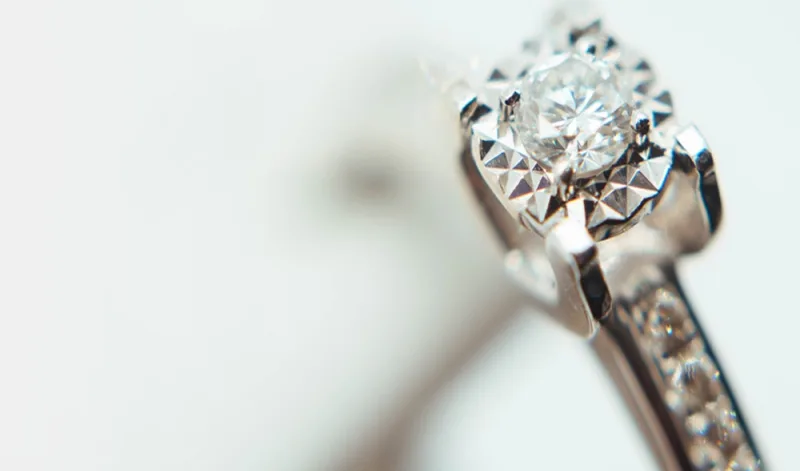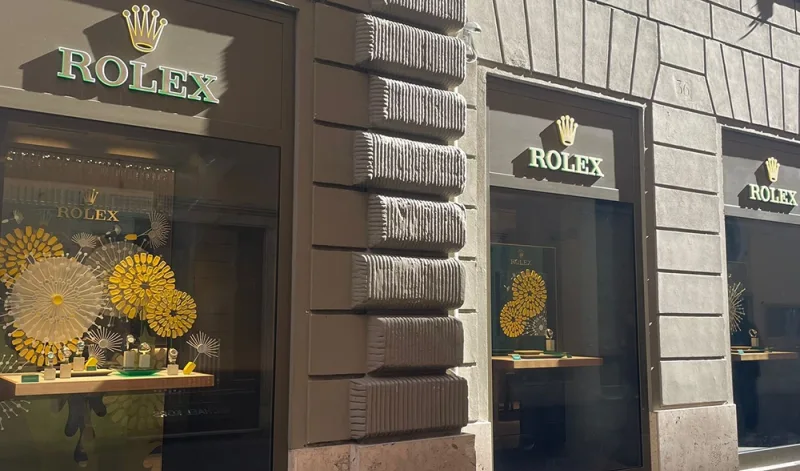If you’re in market for an engagement ring and you’re looking to understand the metals a little more then look no further. Two types of metals often compared when it comes to engagement rings are platinum and white gold. These two metals used for jewellery like engagement rings are virtually identical. Visibly it’s really difficult to tell the difference however one material is far more expensive than the other and the compositions in terms of density of the materials are different. If you’d like to know more about the engagement ring you’re about to purchase, read on and we’ll help you decrypt the differences.
What is white gold?
White gold isn’t actually an element which is naturally formed. White gold is a combination of yellow gold and a few other white metals such as nickel, silver or palladium. It’s still made of gold however it isn’t pure gold throughout. The reason for the combinations of the other metals to form an alloy is to ensure durability across the item of the jewellery being created. Gold simply on its own is quite soft, used on its own within jewellery it can bend out of place rather easily and quickly. Combining these metals to create jewellery ensures durability of the jewellery item such as engagement rings or wedding rings. Delivering the shine, we want to see across our jewellery is as important as durability, this is why rhodium is used in the jewellery industry as a coating to deliver that elegant shine we all look for and appreciate.
Is white gold, actually classified as proper gold?
Just like other metals used to created engagement rings white gold is classified in terms of using the abbreviation “K” which stands for carat, which measures the purity of the gold within the item. The measurement is on an overall scale of 24, with 24K being the maximum representing pure gold. When it comes to white gold the measurements that are most common include:
- 9K – Contains 37.5% Pure Gold
- 14K – Contains 58% Pure Gold
- 18K – Contains 75% Pure Gold
How do you tell how many carats your white gold jewellery has?
Within the UK, gold jewellery including white gold although not completely pure are regulated if the item of jewellery weighs above 1 gram. Jewellery items above 1 gram are required to be hallmarked, which is a stamp imprinted onto the jewellery item. It’s a small imprint you’ll hardly see unless you look extremely closely. Within the UK the Government Assay offices carry out hallmarking. They get sent every
piece of gold jewellery above 1 gram, they assess the item and ensure it meets strict requirements, if it does it will be hallmarked. An associated regulated body ensures the jewellery you buy that is classed as white gold is actually what the jewellery says it is.
What is platinum?
Platinum is not only an almost pure natural white metal used in the manufacture of jewellery, but also it is a lot rarer than gold. It’s almost identical to white gold and as long as you maintain it well, it should last you a lifetime
When considering a platinum engagement ring over white gold expect to pay significantly more for the item of jewellery you’re looking for. Platinum is more expensive than white gold. Price is something to keep in mind. Another difference to consider is that platinum jewellery will get scratched and overtime become dull in colour. Although more expensive and the more natural between itself and white gold, platinum is susceptible to scratches and losing its shine over time.
Why is platinum considerably more expensive than white gold?
Platinum is considerably more expensive than white gold due to the amount of the element you need to create an item of jewellery compared to white gold. You need 40-50% more platinum to create the same item you were creating in white gold. Due to this the prices are vastly different.
The Final Verdict – Conclusion
Pairings
It’s also important to consider pairings. Engagement rings tend to sit consistently next to the wedding ring and they’ll rub against each other, so it’s worth considering ensuring one ring isn’t wearing away the other. So, it’s important to limit this and the best solution is by choosing engagement and wedding rings that are of the same material.
Colour
On initial inspection both white gold and platinum look the same however over time the colour will change. With white gold being constructed of gold and other silver metals, then being coated in rhodium. It’s likely top ups for maintenance will be required. Your jeweller can help with this, cleaning will vastly improve the look of your ring and we suggest professional help is sought if you are unsure how to clean the particular metal type your ring contains.
Durability
Both platinum and white gold are durable metals however they respond to scratches, impact and pressure in different ways. Platinum can last decades due to its high density and it will rarely change shape however the main difference you’ll find is that over time it will lose its original shine. Over the years that will fade away. In comparison to white gold as it’s constructed of gold and other metals over time it’s susceptible to wearing away easier than platinum. If you plan to have engraving on your white gold jewellery, it tends to last a lot longer than on platinum.
Cost
There is a significant difference between the two costs of platinum and white gold. With platinum being denser than white gold, more platinum is needed to complete the same piece of jewellery created in white gold. White gold is often heavily considered to keep the cost down from an item of jewellery.
Jewellery Insurance
When making such a significant purchase it’s important to have jewellery insurance such as engagement ring insurance or wedding ring insurance to ensure your precious items are protected against a wide range of perils such as loss, damage, theft, loss of stone on a worldwide cover. Assetsure provide specialist jewellery insurance that has covering your precious jewellery items at it’ main focus. Whether you have a single item to insure or multiple items of jewellery we’ll be able to support you with specialist jewellery insurance.


